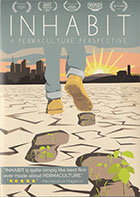
Inhabit: A Permaculture Perspective 2015
Distributed by Inhabitfilm
Produced by Emmett Brennan
Directed by Costa Boutsikaris
DVD , color, 92 min. English with Spanish, French, German, and Italian subtitles
High School - General Adult
Agriculture, Ecology, Biology, Food, Sustainable Living, Business, Economics
Date Entered: 07/05/2016
Reviewed by Irina Stanishevskaya, University of Alabama at Birmingham LibrariesThe documentary starts with a quote by Bill Mollison, co-originator of the permaculture concept, “All we need to live a good life surrounds us—sun, wind, people, buildings, stones, sea, birds, and plants. Cooperation with all these things brings harmony, opposition to them brings disaster and chaos.” The quote clearly explains the main point of the permaculture concept, which cherishes nature as the best teacher. The word permaculture comes from two words: permanent and agriculture. It is a unique approach of adapting diverse principles of ecosystems to agriculture and living in harmony with nature. This approach harbors a lot of potential solutions to the problems of modern pollution-intensive agricultural practices. Do you know that “the US applies 900 million tons of pesticides annually” and looses “approximately 3 tons of topsoil per acre per year?” The filmmakers bring awareness to these problems and educate the audience that permaculture can be an alternative contributor to the sustainable utilization of natural resources and safe farm practice.
The main focus of the documentary is the people who utilize permaculture principles in the daily operations of their farms, orchards, and gardens, in the design of landscapes and playgrounds, and those who promote permaculture by teaching classes, organizing workshops, and publishing books and articles. The filmmakers introduce the audience to a number of such people, including: Ben Falk, the founder of the Whole System Design Permaculture Research Farm in Mooretown, Vermont, Eric Toensmeier, the owner of a 1/10th acre garden in Holyoke, Massachusetts, Lisa Fernandes, the founder of the Resilience Hub in Portland, Maine where she teaches permaculture and ecological design, Lisa Depiano, the founder of the Mobile Design Lab and active participant of the Pedal People in the Northampton, Massachusetts, Steve Whitman, the owner of Resilience Planning & Design in Plymouth, New Hampshire and a permaculture teacher and adjunct faculty member at the Plymouth State University, Dwaine Lee, an urban designer, founder of the Power Polyculture, and teacher at the Five Boroughs Green Roof on Randall’s Island, New York, Andrew Faust, the founder of the Center for Bioregional Living in Ellenville, New York, Paula Amram, an artist, educator and designer of green playgrounds in new York City, Ari Rosenberg, the Urban Farm manager at the Center for Environmental Transformation in Camden, New Jersey, Pandora Thomas, co-founder of the Earth Seed Consulting and educator at Pathways to Resilience in the bay Area of California, Charles Eisenstein, a public speaker and author of several books, Michael Phillips, manager of the Nation Orchard in Groveton, New Hampshire and author of several books, Keith Morris, the founder of the Willow Crossing Farm in Johnson, Vermont and teacher at the University of Vermont, Steve Gabriel, co-founder of the Wellspring Forest Farm in Mecklenburg, New York and instructor at the Cornell University, Rhamis Kent, co-director of the Permaculture Research Institute and consultant in the San Francisco bay Area, Susan Kaye Lein, the Salamander Springs Farm in Berea, Kentucky, and Mark Shepard, the founder of the New Forest Farm in Viola, Wisconsin.
All the stories and interviews provide evidence that the permaculture movement in the United States is strong. The audience can observe real projects based on the use of biological resources and get detailed explanations of the permaculture principles and techniques.
The filmmakers offer 60 minutes of additional scenes, which include Swale Building and Winter Systems by Ben Falk, Edible Ecosystem Garden by Dave Jacke and Keith Zaltzberg, Backyard Plant Tour by Eric Toensmeier, Timebank by Gwen Hallsmith, Umass Garden by Lily Israel and Nathan Aldrich, Wood Craft by Mark Krawczyk, and The Radix Center by Scott Kellogg.
The documentary is appropriate for high school, public and academic library collections. It can be used for many educational programs focused on permaculture, alternative agroecological movements, organic farming and gardening, and agricultural ecology. To get additional information regarding the documentary, please visit the official website.
Awards
- Audience Choice Award, Environmental Film Festival at Yale University, 2015